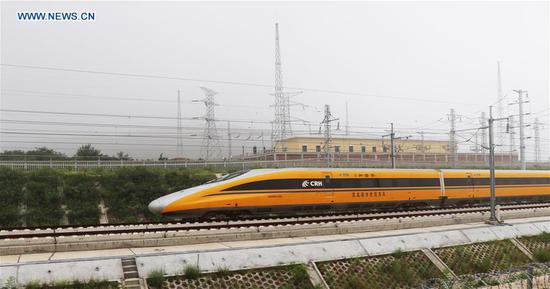U.S. exporters of skiing products will be hit by the China-U.S. trade row and are likely to lose the Chinese market, which has huge growth potential driven by the upcoming Beijing 2022 Winter Olympic Games, analysts said.
A sales manager surnamed Liu who works in a ski resort in Harbin, Northeast China's Heilongjiang Province, told the Global Times on Monday that "we were considering replacing our old Austrian-made snowboards with U.S. ones. But given the current U.S.-China trade war, we will give up buying U.S. ski products to show our patriotism."
To respond to U.S. tariffs on Chinese goods, China on August 3 launched countermeasures of proposed tariffs on U.S. products, including a 25 percent tariff on U.S. ski suits and boots as well as a 20 percent tariff on skis, ski fasteners and other ski equipment. China has not set a specific date for the tariffs to take effect.
"The proposed tariffs on U.S. ski imports will raise their cost in the Chinese market, which would affect Chinese buyers' choices," Wang Jue, founder of Beijing-based ski equipment workshop Cosone, told the Global Times.
"It is not cheap to buy a U.S. brand Nitro snowboard, which cost me more than 5,000 yuan ($725). If there is an increase of about 20 percent in the price of U.S. ski equipment, I'll shift to other foreign brands, such as those from Austria and Canada, which are also good," said a Beijing-based ski enthusiast surnamed Tang.
"Imported brands account for 70 to 80 percent in the domestic ski market, and athletes with more than one year of skiing experience and some money are inclined to choose foreign brands. The imported ski brands mostly recognized by the Chinese market are those from the U.S., followed by Japan, Italy and Germany," a Beijing-based industry insider who asked to remain anonymous told the Global Times on Monday.
The insider attributed U.S. brands' relatively large market share in China to several factors. For one thing, the U.S. is a major producer of such sports equipment and "these brands have also invested a lot in advertising in the domestic market. Also, U.S. brands have been present in China for a longer period than other foreign brands," he said.
Analysts said despite U.S. ski brands' current advantages, they are likely to lose Chinese consumers due to sentiment related to the bilateral trade tensions.
"It will be quite a big loss for the U.S.," the industry insider noted.
Given the situation, Chinese firms will seize any chances to further advance their ice and snow business, He Wenyi, executive director of Peking University's China Institute for Sports Value, told the Global Times on Monday.
Although China's ice and snow sector has developed slowly in the past decade, the growth potential in its skiing products market will be the largest in the world, thanks to the driving power of the upcoming Beijing Winter Olympic Games and the country's policy to encourage 300 million people to participate in winter sports, He said.
There are many Chinese manufacturing companies now trying to enter the snow industry, He said, adding that plenty of ski equipment was imported in previous years, but many production plants are soon to be set up in China.
"It is possible that U.S. ski companies will seek cooperation with Chinese companies and establish plants in the country, aiming to avoid tariffs," said He.
The scale of China's ice and snow industry stood at 397.6 billion yuan in 2017 and will expand in the next three years, said an industry report.


















































